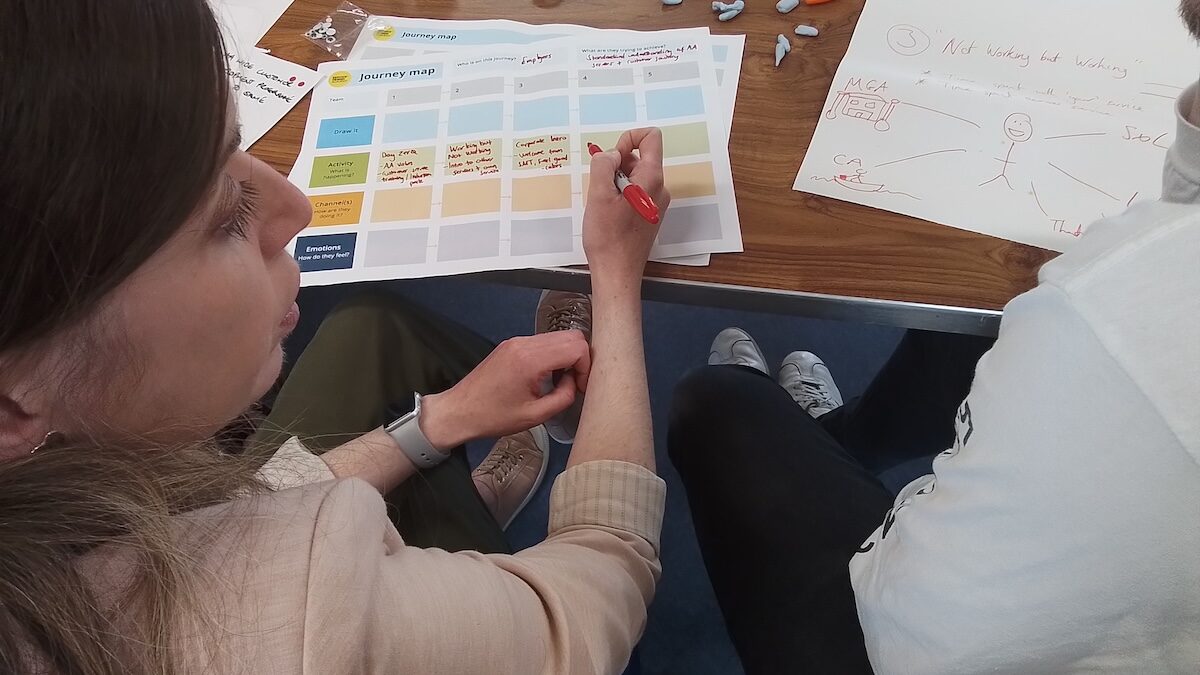Background
Scottish Social Services Council (SSSC) partnered with Service Design Academy (SDA) to build service design capability to support the “Future Proofing” transformation programme. A learning pathway supported the development of live elements of the programme as project managers completed a range of practical service design courses.
SSSC Future Proofing Programme
Supporting more than more than 208,000 people working in social services in Scotland, SSSC is the regulator for the social work, social care and children and young people workforce in Scotland. SSSC protects the public by registering this workforce, setting standards for their practice, conduct, training and education and by supporting their professional development.
The Future Proofing transformation programme aims to simplify and clarify digital registration services for all its members to ensure members understand the benefits and standards required for high quality care.
A consultation in 2022 recognised that project teams at SSSC needed to adopt a person-centred approach. Service Design Academy was commissioned to design and delivery a comprehensive training pathway to support this.
The key goals of the pathway were to:
- Embed a service design approach in the organisation, making services better for all users.
- Enhance creativity and collaboration
- Nurture innovative, user-focused, and collaborative ways of working and problem-solving.
Training was delivered between autumn 2022 and summer 2024.
To support the embedding of a person-centred design approach across the Project Management Office a course was co-designed with SSSC leads – Practical service design. Eight colleagues then elevated their expertise to service design practitioner level with the Professional Development Award.
The pathway: adoption of the double diamond methodology
Learners were taught the Double Diamond design methodology and introduced to a variety of tools and methods through practical exercises to address a challenge related to the Future Proofing programme.
The training solution took the learners through all stages of the design process, including:
- User research
- Analysis and synthesis of data
- Problem framing
- Idea generation and prioritisation
- Prototyping
- Storytelling
Impact
Real-world application
Through the pathway, learners worked on real world organisational projects that were part of the “Future Proofing” programme.
SDA worked closely with SSSC and the training coordinators to ensure that the content of the training was not only valuable as a learning exercise but supported the development of internal design work, acting as a springboard for potential future projects to be taken back to the wider organisation
Integration and commitment
Before any project starts, staff must now demonstrate how they will undertake the necessary design activities to support the project request.
Service design principles are integral to the commencement of any work, with all staff committed to adopting a service design approach. This involves conducting thorough research and co-designing potential solutions.
Community of practice
The support within the organisation has led to the formation of a community who collaborate and support each other through the transformation programme’s projects and their general work at SSSC.
The PDA learners supported each other to continue raising awareness throughout the organisation whilst honing their skills and building their service design capability.
Jane Powell, an SSSC Learning and Development Advisor shares her experience of learning with SDA.
“The PDA offered the perfect opportunity to consolidate and implement new learning in practice, building my confidence in service design approaches. I was working with others on a large project – a new model of continuous professional learning (CPL) for Scotland’s social work staff directly shaped by stakeholder involvement.
There is a particularly visible output in the form of a Minimum Viable Product website where members can find out what CPL they are required to do, personalised to their role and development goals, with links directly to the Continuous Personal Learning (CPL) resources across several different bodies in one place.
I planned and delivered two co-design events. It was a nerve-racking, challenging, and surprising experience. I have no doubt that the co-designed product, now live online, is user-friendly due to the inclusive and iterative nature of the development.
That moment when the first visual representation of the product emerged from the combination of research, knowledge, ideas, and critical thinking of everyone involved was exciting; to have a first iteration of the product to show others and progress.
The biggest challenge was being brave enough to try new and creative approaches and maximising collaboration and the continued involvement of stakeholders throughout the project when time is a precious commodity.
I have learned that working within a range of perspectives can feel messy, and that is okay. When allowing time to explore, play, and sense-make, new things appear.
From my perspective, the impact of using service design is that people see the human face of the organisation and a genuine commitment to putting people first.
I look forward to service design continuing to be embedded into project management.”
Katie Murrie, Service Design Academy lead educator shares her thoughts on SDA’s learning partnership with SSSC.
“By having the right conditions, commitment, and strategic approach, organisations can not only meet their immediate challenges but also lay a solid foundation for sustained improvement and innovation in digital services.
By embedding service design principles into project management and encouraging a culture of continuous learning and collaboration, SSSC has not only enhanced its digital service delivery but also strengthened its commitment to user-centred design.”
Find out how the Service Design Academy can support your team to embed a human-centred approach to digital transformation:
Partner Content in association with Service Design Academy




